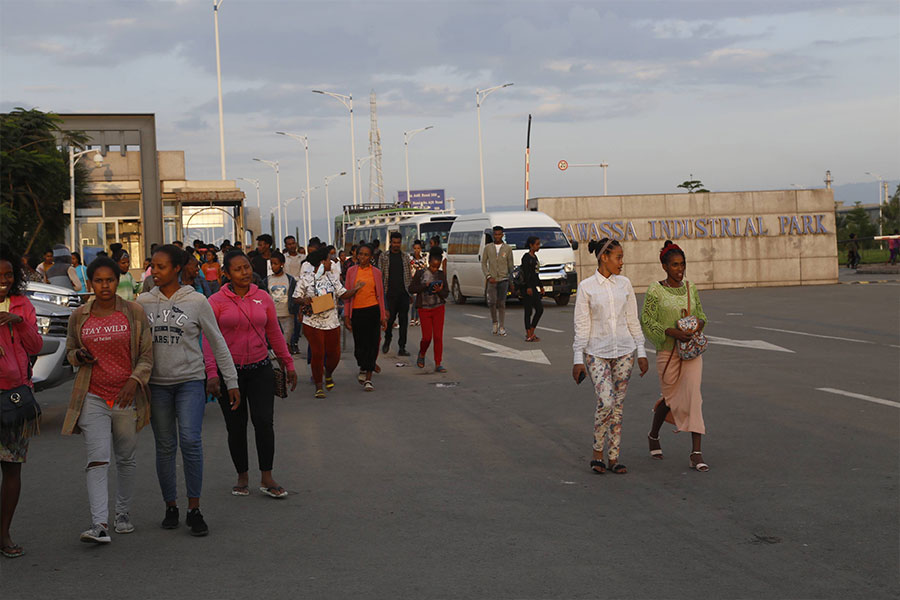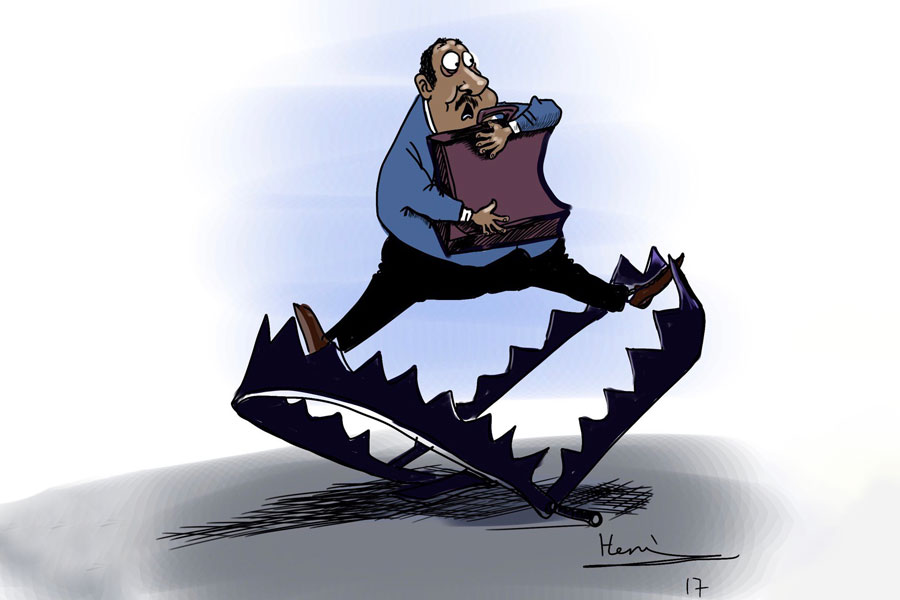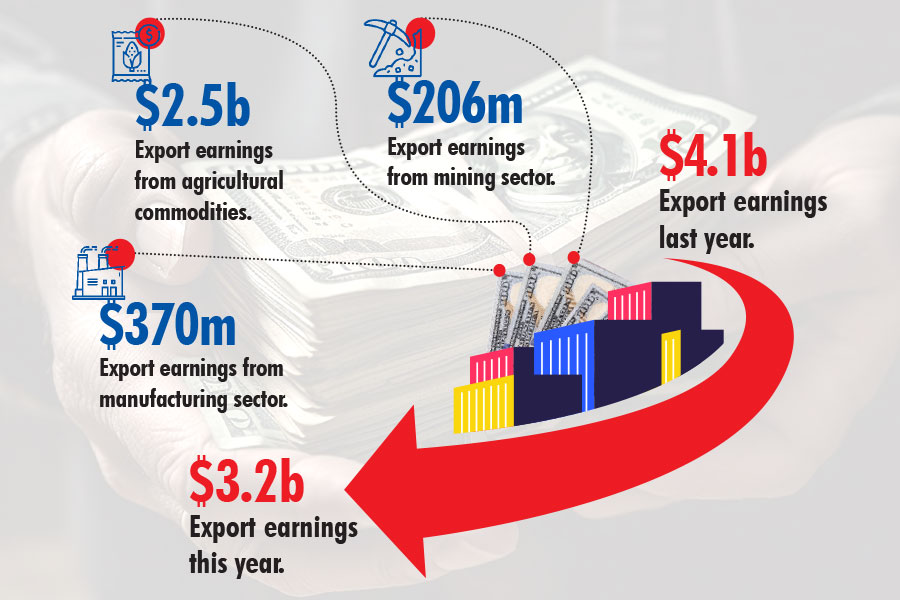
Fortune News | Oct 30,2021
On Tuesday, February 18th, the eve of the 45th anniversary of the Tigrai struggle against the Dergue regime, Meqelle, the capital of Tigray Regional State, was hot.
The city was decorated with national and regional flags. Celebrants traveled from across the region to join in the festivities. And many people wore traditional clothes in honor of the anniversary.
The Regional State celebrated the festival with over a week of events, including showcases of its military strength and development projects.
Among the festival participants was Abdu Husen, who is in his early 30s and working in the town of Hewan, some 60Km away from Meqelle.
He arrived on the eve of the festival but found it very difficult to find a room to stay in for three nights. His attempt to find a room in a guesthouse failed twice.
The city was vibrant throughout the week as visitors arrived in anticipation of the festival. Local businesses, especially hotels and bars, benefited from the arrival of these new customers.
Northern Star Hotel, located near Adi Housi Traffic Light, enjoyed an increase in business because of the anniversary event. The Hotel, which started service three years ago, recently rebranded itself and now has a total of 155 employees.
After noticing the demand from previous events, the Hotel built an additional 36 rooms (for a total of 84) to respond to the demand.
Customers started booking hotel rooms a month ago. Two weeks before the holiday, all of the hotel rooms were booked at least a week in advance. Visitors like Abdu, who tried to book their rooms during the event, were far too late
The Hotel classified the rooms as semi-suite, king, twin, queen and simple standard settings. The maximum price for a room was 1,950 Br, while the minimum price was 1,250 Br. The price of each room increases by 500 Br around the time of the festival.
"If we had more rooms," said Azeb Asayehgn, marketing manager of the Hotel, “they would have been fully booked."
Usually, the business of hotels is relatively slow. But during special events and carnivals, the number of customers increases, according to Azeb.
Kedamay Weyane business centre, which is located in the centre of the capital consists of boutiques, that sell clothing and fast-moving consumer goods.
“We have a lot of customers who turned back after we told them the rooms were fully booked,” she adds.
The number of customers in the Hotel has increased by 50pc, and the employees are working overtime to accommodate the demand.
During other festivals and holidays, such as the Diaspora Festival, Graduation and Ashenda, a cultural celebration in Tigray and Amhara regional states, hotels in the city are fully booked.
These celebrations have important economic benefits, motivating businesses to respond to the demand. They increase the income of businesses in the city and inject money into the local economy.
Northern Star Hotel generates up to three million Birr from different services in a given month. But, according to the marketing manager, revenue increases 20pc to 30pc during the festival.
Equar Kahsay, an expert in media capacity building at Tigray Communications Bureau, agrees with Azeb in that the festival stimulates the business activity of the city.
"The guests are willing to spend money on food, rooms and recreation, but the hotels do not have enough capacity to serve the requests," Equar said.
The festival attracted 150,000 people to Meqelle, most of whom stay four to seven days. On average, a visitor spends 400 Br daily. If, taking the minimum, he stays four days the festival generates close to 240 million Br for the city in total.
Meqelle has 208 hotels with an average of 100 rooms, out of which eight are star rated. In this fiscal year, new five-star hotels began service.
The Tigray Culture & Tourism Bureau believes that the city's hotels cannot handle the demand of the guests during festival seasons. In the coming years, six additional hotels with more than 150 rooms each will join the market.
“We believe that currently, the existing hotels cannot accommodate the flood of guests that flow into the city during festivals, so we are working aggressively to increase the number and standard of the hotels,” said Yeman Gedelu, accreditation & regulatory director of the Bureau.
He says the region also provides land for investors by giving priority to those who build four and five-star hotels.
During the last fiscal year, 91,349 international tourists visited the region and generated 175.4 million dollars. In the first five months of the current fiscal year, 45,501 foreign tourists have visited the region and generated 62.8 million dollars.
Bars are also booming in the city. Zeselase Pub is one of the bars located in the middle of town around Kebele 16, a popular destination for festival visitors.
Even though the price of beer has increased from 17 Br to 25 Br and draft beer showed a five Birr increase since last week, the bar was as crowded as ever.
Mearg Aderm, an owner of Zeselasse bar, said he feared that the customer flow would decline due to the price increase. Instead, business increased.
"The count is increasing with 20 to 40 new customers each day," he said.
On Wednesday, the day of the festival, he sold close to 12 crates of beer before lunchtime. Normally, this is the amount he would sell over the course of an entire weekend. Thanks to the festival, his income has increased by 40,000 Br that day.
Helen Hailu, the owner of Helen bar, located near Desta Hotel behind Meqelle University, Adihaqi campus, has also seen growth in the number of customers who come to her bar because of the festival.
Helen, who sells beer, wine, whiskey and vodka, started the business five years ago by renting a house for 8,000 Br a month.
"The flow of customers has increased, especially since last week,” Helen said. "I see at least 40 to 50 new customers a day."
During the festival seasons, Helen's income increases at least 3,000 Br a day.
"It's a time for us to do good business," she adds.
Tekelab Habetu, in his early 30s, is a tailor who received more business from the celebration. Tekelab, who has been in the business for three years, buys clothes such as trousers, shirts and coats from Almeda Textile Plc, a plant which is located seven kilometres from Adewa town. He applies different designs to them and sells them to the market.
He began sewing designs on clothes two months before the Yekatit 11 celebration. He sells t-shirts for 200 Br, coats and jackets for 1,000 Br, and trousers for 500 Br. On average, he sells up to 40 clothing items of each type per day making up to 68,000 Br a day.
He hired four people who sell clothes while he is focused on his designing work.
"I'm occupied with putting the patterns on the clothes; hence I need additional staff to assist me," he said. “I like this business, and I plan to get prepared well for the next holidays like Ashenda, and the other festivals.”
The region’s investment flow has increased in the last two years, according to data from the Tigray Investment & Export Commission. Two years ago, the Regional State attracted 27 billion Br in investments. Last year, that figure grew to 47 billion Br.
In the first five months of this fiscal year, 17 billion Br was registered in the capital by investors who have received licenses. Out of this, 56pc are in the industry sector, while 18pc work in the construction sector.
Nowadays, the region's investment flow is highly increasing. The main reason for this is the peace and stability of the region, says Alem Berhan, a senior expert of monitoring & evaluation of investment project at the Tigray Investment & Export Commission.
Last week the city inaugurated infrastructure projects worth four billion Birr, including roads built throughout the region. It also placed foundation stones for hospitals, schools and other infrastructure projects worth 1.3 billion Br in celebration of the holiday.
Abdu, who took part in this festival, has learned his lesson for next year.
“Next time I will book a room earlier,” he says.
Even though it is a booming seasonal business, the festival will help the city to motivate the economic activity, and a large amount of money will be injected into the economy, says Atlaw Alemu (PhD), a lecturer at Addis Abeba University’s Faculty of Business & Economics. But he says these gains are short-lived, since many of the participants will return to their homes.
For sustainable growth and benefit, Atlaw recommends the Regional State support the local economy consistently by focusing on the manufacturing sector.
"The local economy should be integrated with the manufacturing sector to get more benefits," he adds.
PUBLISHED ON
Feb 22,2020 [ VOL
20 , NO
1034]

Fortune News | Oct 30,2021

Editorial | Oct 20,2024

Commentaries | Dec 16,2023

Fortune News | Jun 29,2019

Fortune News | Jul 01,2023

Commentaries | Aug 06,2022

Commentaries | Jul 03,2021

Commentaries | Aug 17,2019

Viewpoints | Aug 25,2024

Advertorials | Jul 17,2023

Dec 22 , 2024 . By TIZITA SHEWAFERAW
Charged with transforming colossal state-owned enterprises into modern and competitiv...

Aug 18 , 2024 . By AKSAH ITALO
Although predictable Yonas Zerihun's job in the ride-hailing service is not immune to...

Jul 28 , 2024 . By TIZITA SHEWAFERAW
Unhabitual, perhaps too many, Samuel Gebreyohannes, 38, used to occasionally enjoy a couple of beers at breakfast. However, he recently swit...

Jul 13 , 2024 . By AKSAH ITALO
Investors who rely on tractors, trucks, and field vehicles for commuting, transporting commodities, and f...

Oct 18 , 2025
The political establishment, notably the ruling party and its top brass, has become p...

Oct 11 , 2025
Ladislas Farago, a roving Associated Press (AP) correspondent, arrived in Ethiopia in...

Oct 4 , 2025
Eyob Tekalegn (PhD) had been in the Governor's chair for only weeks when, on Septembe...

Sep 27 , 2025
Four years into an experiment with “shock therapy” in education, the national moo...